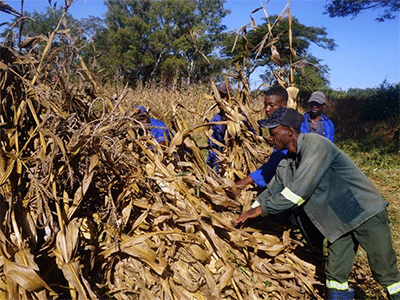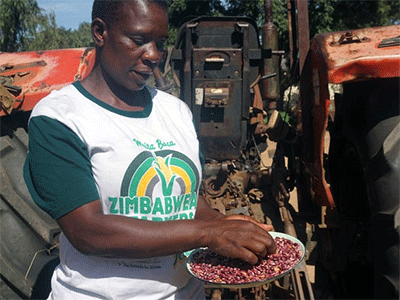Four United Methodist mission farms in Zimbabwe got a major boost from the Yambasu Agriculture Initiative, with some seeing a bumper harvest for the first time in a decade.
The farms at Nyadire, Hanwa, Old Mutare and Mutambara missions had mostly been lying idle or were being partially utilized. Through a Yambasu Agriculture Initiative grant during the 2022-23 production season in Zimbabwe, the farms received seeds and fertilizer, along with equipment and technical support.

An initiative of the United Methodist Board of Global Ministries named in honor of late United Methodist Bishop John K. Yambasu, the program offers funding to episcopal areas in Africa developing new agricultural projects that utilize United Methodist land holdings.
Your support of the World Service Fund apportionment supports program-related general agencies, which are especially important to the common vision, mission, and ministry of The United Methodist Church.
Morgan Jeranyama, Yambasu Agriculture Initiative national project consultant in Zimbabwe, said the funding was received in two folds.
“The (mission) farms received crop inputs and support to repair most of the implements, while technical support was provided to farmers in the rural communities,” he said.
The Rev. Lancelot Mukundu, Nyadire Mission station chair, said there hasn’t been maize production on the farm since 2018.
“Today, we are proud to announce that 18.5 hectares is under maize production while 2 hectares is under sugar beans,” Mukundu said. One hectare contains about 2.47 acres.
“The produced crop will be sold to recapacitate the farm. Furthermore, the excess produce will be distributed to other units of the mission farm through an interdepartmental trade,” Mukundu said. He said through the initiative, the farm created employment for five people and provided for interns from agriculture colleges.

At Hanwa Mission farm, the season started well with a combined 8 hectares of maize and 1 hectare of sunflower planted, said the Rev Future Sibanda, the station chair.
He said farmers followed a careful analysis of rainfall patterns and drought tolerance of the different maize seed varieties, but a three-week dry spell in March slightly affected some of the maize crop.
“The sunflower crop has performed well and a good harvest was made. These lessons proved vital for our drought resilience focus,” Sibanda said.
Jeranyama said Old Mutare Mission is having success with raising poultry.
Three batches of 500 broiler chickens were raised in a small fowl area leased from the high school during the year.
“The program provided vital production training to the project team and mortality was extremely low. And they realized a profit of USD $3,500,” he said.
This encouraged the high school to start its own chicken project. Jeranyama said it is doing fairly well and demonstrates the impact of capacity building of the different units at the mission farm.
Nyakunu Zimunya Justice Chakanaka with the church’s Mutambara Mission farm said he is grateful for the money given to the mission. “The grant has been very helpful in upgrading our food chain,” he said. “We managed to farm 10 hectares of maize crop and the yield has improved fairly.
“Currently we have started to engage in piggery and poultry production,” he said.
“To GBGM through the Yambasu Agriculture Initiative, keep up the good work. Your support will not go in vain. We promise to work hard.”
excerpt from a story by Kudzai Chingwe, communicator for the Zimbabwe East Conference.
The World Service Fund provides basic financial support to program-related general agencies, which are especially important to the common vision, mission, and ministry of The United Methodist Church. Through World Service funding, agencies support annual conferences and local congregations in living out God’s mission for the worldwide Church. General agencies also provide essential services and ministries beyond the scope of individual local congregations and annual conferences through services and ministries that are highly focused, flexible, and capable of rapid response.





